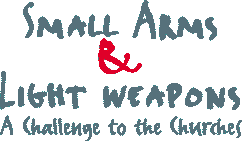
A nation-wide campaign against violence and for a ban on small arms was launched on 7 July 2000 by Viva Rio. The campaign slogan is "Enough! I want peace!" (Basta! Eu Quero Paz).
In 2000, Viva Rio collected 1,350,000 signatures from Rio citizens
in favour of a ban on the use and sale of small arms. The WCC supported
the campaign and called on its member churches and the International
Action Network on Small Arms (IANSA)
to do likewise. Through its peace-building efforts among local communities
and its work on microdisarmament, Viva Rio became a founding partner
of the WCC's "Peace to the City" network;
it also works closely with the Council in the context of the Decade
to Overcome Violence.
A national campaign
At 7 pm on the seventh day of the seventh month of 2000, millions of people across Brazil watched popular actress Fernanda Montenegro on their favourite TV channel asking them to turn off their lights, place lighted candles in their windows, and go to work wearing white clothes to signal their desire to stop violence and crime and ban the use and sale of small arms. Many did as was asked... and a national campaign was born!
|
 
|
|
On the same day, Viva Rio handed out manifestos against armed violence
and for the ban on small arms in 14 state capitals, including cities known
for their extreme violence - like Recife, Brazilia, Salvador, Vitoria,
São Paulo and Rio.
Those who signed the manifesto staged street demonstrations and committed themselves to explain the campaign objectives - "social investment" for youth in the poorest and most violent city districts, approval of the draft law, police reform, and the democratization of the legal system - to friends and neighbours, and to demand government action. Viva Rio built a 150-square-metre mural, divided into a "Mural of pain" on which hundreds of relatives and friends stuck photos and texts about violence victims, including police officers, and a "Mural of hope" where others, including children and graffiti artists, put their ideas on overcoming urban violence. As part of the campaign, Viva Rio proposed an international boycott on arms and munitions exports to Paraguay, claiming that Paraguay re-exports the weapons back to organized crime in Brazil. It also pressed for a meeting between US and Brazilian lawyers to examine the best way to proceed against US arms manufacturer Taurus & Rossie for the harm done by their products to Rio's population at large. Viva Rio continues to be a leader in Brazil, South America and the world in developing community-led initiatives to combat the proliferation of small arms, including annual arms destruction campaigns, police training and public education. |
Return to Challenge to the Churches -- stories of hope
©
2001 world council of churches | remarks to webeditor